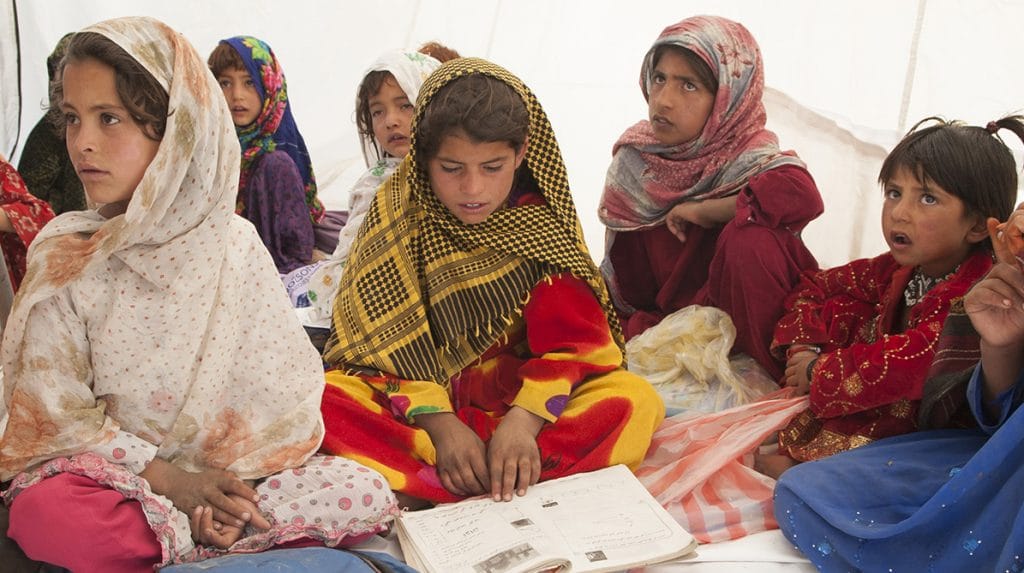Take a moment and imagine what it’s like to be a girl or young woman living in Afghanistan today…
Even before the Taliban took control of your country last summer, the odds of learning to read or pursuing a career were stacked against you. Assuming you are one of the millions of girls who live in a remote, rural area, education was already most likely not an option due to an insufficient number of teachers and schools where you live. Or perhaps ongoing war made it too risky for you to travel to and from the nearest school.
On top of that, you’ve probably been confined by conservative cultural norms – which have long prevailed outside of cities – that relegate you to the domestic realm and prioritize education for boys. If you did go to school, you likely were unable to advance beyond a few years and were forced to drop out, perhaps even to marry at an early age.
If you were lucky enough to have reached high school, the new ban on girls’ secondary education has likely dashed your dreams of continuing your education. Or if you were luckier still to be attending university, new rules requiring you to be educated by a female teacher may mean you can no longer attend your classes and complete your degree because there’s no female professor to teach your class.
And if you are any one of the 3.7 million Afghan females who had beaten the odds and were enrolled in school before the Taliban took control, you’re probably bewildered by why you – an innocent child who longs only to read books or study math, or to become a teacher or doctor – are so threatening to a group of men armed with guns and bombs.
Most of us may find it hard to imagine how girls and young women in Afghanistan muster the strength to keep going; to keep fighting to beat the odds. Yet at CAI, we are amazed and deeply inspired by what we are seeing in Afghanistan today: despite the odds, Afghan girls are fighting harder than ever to pursue an education.

Thanks to your generosity, this spring, Central Asia Institute is doubling down on efforts to support education programs for girls and young women in Afghanistan.
Working closely with our local Afghan partners, CAI is focused on investing in projects that will safeguard access to education – ensuring thousands of girls and young women living in remote, impoverished regions of the country have the opportunity to pursue an education.

Our strategic priorities include:

Thanks to you, as spring gets underway, approximately 4,200 children – more than half of whom are girls – are being enrolled in over 140 community-based schools supported by CAI. These classes will accommodate both primary school-aged children and older girls who will benefit from accelerated learning programs to help them catch up with their peers.
CAI is also working to meet the urgent need for more, better-trained teachers. We are prioritizing female teachers given the Taliban’s rules on female-only instruction for girls. In the coming weeks, approximately 140 women and men who’ve been recruited from the communities where these classes are located will be trained to become teachers. This support offers them the opportunity to not only pursue a profession but also earn an income at a time when their country is facing an economic crisis and poverty is rife. In addition, CAI is supporting training for an additional 320 teachers at local government schools in these areas to improve the quality of education the children living in remote villages receive.
Given the enormous challenges that have arisen over the past six months since the U.S. withdrew from Afghanistan and the Taliban seized control, we couldn’t be more committed to these programs or more thankful to you for making them possible.
At the same time, CAI and our local partners are well aware that new challenges and obstacles are likely to arise in the future. If anything, our 20-plus years of experience working in Afghanistan has taught us to be prepared for adversity, skilled at adapting, and resilient in the pursuit of our mission. In the coming months, we’ll do our best to keep you posted on the progress of our programs and changes on the ground. In the meantime, we are always here to answer any questions you might have.
Once again, we are so deeply grateful for your steadfast commitment to Central Asia Institute, and the people we serve. Thanks to you, Afghan girls can again dream of a better, brighter future.
Please feel free to reach out to us with any questions that you might have. You can reach us at info@centralasiainstitute.org or 406-585-7841.
KEEP UP WITH THE LATEST NEWS
Sign up to receive updates and stories from the field.
Privacy Statement | Copyright 2025 Central Asia Institute. All rights reserved. Site Map
CAI is a U.S.-registered nonprofit 501(c)(3) organization, EIN #51-0376237. Contributions may be tax-deductible in the U.S.